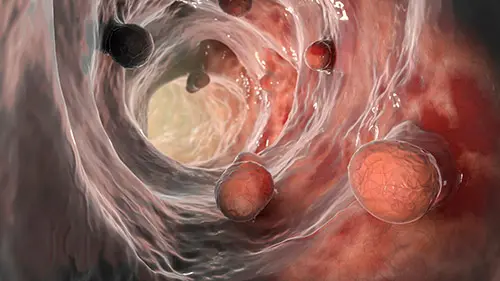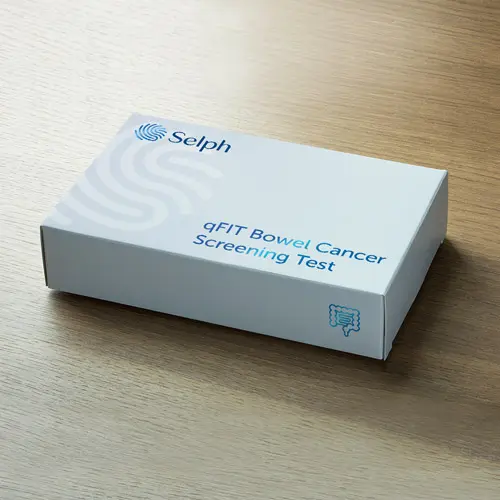7 evidenced-based actions you can take to prevent bowel cancer or pick it up earlier
Last updated
7 Actions to Prevent Bowel Cancer
- Exercise more
- Optimise your diet - more whole grain, fibre and dairy. Limit alcohol, sugary drinks and ultra-processed foods.
- Don't smoke
- Maintain a healthy weight
- Know your family history
- Screen yourself
- Be "bowel aware"
Bowel cancer is the 4th commonest cancer in the UK, affecting 1-in-15 of us1. But did you know that over half of bowel cancer cases in the UK are thought to be preventable2?
We’ve put together the top 7 evidence-based actions you can take to lower your risk of developing bowel cancer or at least pick it up at an early stage. But first, let’s touch on what bowel cancer is and what causes it.
What is bowel cancer and how does it develop?
Bowel cancer, also called colorectal cancer, is where a tumour develops in the large bowel or rectum. To begin with, the tumour stays in the bowel and doesn’t spread. However, with time, it can spread to the small glands near the bowel (called lymph nodes) and from there on to the liver or lungs. As you can imagine, it’s much easier to cure bowel cancer when it’s only in the bowel. This is why early detection is so important.
Cancerous tumours in the bowel actually start off as small growths called polyps. These polyps are very common but only about 1-in-10 polyps will actually turn into bowel cancer in the long term. It’s pretty difficult to tell which polyps will turn into cancer so we generally just remove them if we see them during a colonoscopy (camera test to look inside the bowel).

What are the main risk factors for bowel cancer?
The main factors influencing your risk of developing bowel cancer are your age, your lifestyle and your family history.
Age is actually the main risk factor and the older you are the higher your risk of bowel cancer. In the UK from 2016-2018, over 4 in 10 people who got bowel cancer were above age 75, compared to 1 in 10 under the age of 503.
However, the under 50 age group is the only group where the rate of bowel cancer has been increasing in recent years, which is thought to be mainly due to lifestyle factors4.
Lifestyle factors such as smoking, diet and exercise play a large part in the development of bowel cancer. So much so that more than half of bowel cancer cases are thought to be caused lifestyle factors and are regarded as being “preventable”2.
Your genes can also increase your risk of developing bowel cancer. If you have a first degree-relative (parent, sibling or offspring) who developed bowel cancer, particularly if they were under the age of 50 when diagnosed, then you have a higher risk of bowel cancer yourself.
What are the top 7 things you can do to prevent bowel cancer or pick it up early?
If half of bowel cancers are preventable, then what are the actions you can take to lower your risk? This is what the data says:
1. Exercise more
A recent study found a significant reduction in the risk of cancer with as little as 4 minutes of vigorous physical activity a day.
There’s very good evidence that exercise can cut your risk of developing bowel cancer risk by about 20%5. Importantly, the beneficial effect of exercise holds true even for people with a family history of bowel cancer6. So if you do have a relative with bowel cancer, it’s even more reason to exercise.
The question is, how much exercise do you have to do? The bottom line is, the more you exercise you do, the lower your risk. If you follow the current recommend physical activity guidelines of 150 minutes of moderate intensity activity and two resistance training sessions per week, you can expect to lower your bowel cancer risk by about 10%7. You probably need to double this to get the most benefit. But remember that being physically active around the house or at work can also help.
Although more exercise is better, the key message is that even a little exercise is better than none. A recent study found a significant reduction in the risk of cancer with as little as 4 minutes of vigorous (you need to be out of breath) physical activity a day8.

2. Optimise your diet
What you eat and drink ends up in your bowel so it’s probably not surprising that your diet has an impact on your risk of bowel cancer. The difficulty with diet data is that you have to rely on observation studies (i.e. asking people what they ate) because you can’t force people to eat a certain diet for 20 years to see the effect on bowel cancer risk. The trouble with asking people what they eat and drink is that, a) people forget what they had for breakfast, never mind the last week, and b) people aren’t always truthful!
So you have to take the dietary data with a pinch of salt. That said, there are three dietary optimisations that have pretty good evidence regarding both bowel cancer risk and your health overall.
Drink less alcohol and fewer sugar-sweetened drinks
The increasing incidence of bowel cancer in the under 50s is thought to be partly driven by higher alcohol and sugary-drink consumption amongst people born after 1960. We have strong evidence that an alcoholic drink a day will increase your risk of bowel cancer by around 7%9. Note that this amount of alcohol may still be within the UK alcohol guidelines.

There are lots of reasons to stop drinking sugar-sweetened beverages. One of them is because they increase your risk of bowel cancer. Women who drank two or more sugary drinks a day had twice the risk of developing bowel cancer before the age of 50 compared to women who drank fewer than one a week.
Eat more whole grain, fibre and dairy products
In terms of beneficial effects, whole grains, fibre and dairy products have the strongest evidence for preventing bowel cancer. Data suggests that eating around 90g of whole grains (e.g. wheat, barley and rye) per day is associated with a 15% reduction in bowel cancer risk10. Fibre is one of the major constituents of whole grains, along with vitamins and phytochemicals and studies suggest a 10% reduction in bowel cancer risk for every 10g fibre consumed per day11. Fruit and vegetables are another excellent source of fibre.
You might be surprised to hear that the consumption of dairy products is strongly associated with a reduction in bowel cancer risk. Around 400g of dairy (including milk) a day can be expected to reduce bowel cancer risk by about 13%10. This is likely to be due to its high calcium content which has a protective effect.
Reduce processed meat consumption
There is a lot of debate around around whether red meat consumption increases bowel cancer risk. Red meat consumption tends to be associated with an overall poor quality diet and higher consumption of processed foods. Indeed a, very thorough analysis recently showed no convincing association between red meat consumption and bowel cancer risk12.On balance, it's likely that ultra-processed food consumption, rather than red meat, is the real driver of bowel cancer risk13. Given the other negative effects of ultra-processed foods on metabolic health, we would strongly advise cutting these from your diet where possible.
3. If you smoke, stop
Do you need another reason to stop smoking? Smoking increases both your risk of developing bowel cancer and dying from bowel cancer14. Sadly, in terms of absolute numbers of people affected, smoking is the largest preventable cause of bowel cancer2.

4. Maintain a healthy weight
Being overweight or obese is an independent risk factor for developing bowel cancer15. This means that carrying too much weight itself, and not simply reduced exercise or poor diet, is directly linked to developing bowel cancer. This is likely to be because excess fat causes inflammation which is one of the drivers of cancer.
The relationship between excess weight and bowel cancer affects men and women but is particularly strong in men. However, obesity in women is also strongly associated with endometrial and breast cancer so it's equally important to avoid in both sexes.
Easier said than done I know, but achieving and maintaining a healthy weight is foundational to health in general and will lower your cancer risk.
5. Know your family history, know your risk
You can’t change your genes but being forewarned is forearmed as the saying goes. So find out your family cancer history. This is relevant not only to bowel cancer but also to breast and prostate cancer amongst others. It’s particularly important to know about any first degree relative who had bowel cancer and their age at diagnosis. The younger they were (particularly if under 50) the more likely that their genes had a part to play.
If you do have a family history of bowel cancer it’s worth discussing this with your GP. Depending on your history, you may be eligible for earlier bowel cancer screening in the UK. Even if you’re not eligible for earlier screening, it may still be valuable to arrange for a screening test yourself.
6. Screen yourself for bowel cancer
You are three times more likely to live for at least 5 years after being diagnosed with bowel cancer if it’s found at screening compared to it being found after referral by your GP.
Unfortunately, by the time most bowel cancers have been diagnosed, they’ve already spread to the local glands or to other organs16.
If you do develop bowel cancer, the best chance you have of beating it is picking it before you get symptoms, by screening. You are three times more likely to live for at least 5 years after being diagnosed with bowel cancer if it’s found at screening compared to it being found after referral by your GP17.

The Bowel Cancer Screening Programme starts at different ages across the UK. It starts at 50 in some places but 60 in others. In contrast, it starts at 45 in the United States. This is largely due to the lack of healthcare resources in the UK. If you want to know more, check out our recent article reviewing the evidence on when you start screening for bowel cancer.
It’s simple to screen yourself for bowel cancer with our qFIT Bowel Cancer Screening Test - the same test that’s used in the UK Bowel Cancer Screening Programme.
7. Be “bowel aware”
As mentioned above, one of the difficulties with bowel cancer is that by the time you get symptoms, it’s often quite advanced and harder to treat. So if you notice bowel symptoms, it pays to get them investigated as soon as possible. Be familiar with these 5 common symptoms of bowel cancer and take them seriously, particularly if you’re over 40. Check out our article on [the main bowel cancer symptoms] to find out more.
The Five Common Symptoms of Bowel Cancer
- Blood in your stool
- Change in bowel habit (e.g. going more often or a change in consistency)
- Stomach pain
- Unexpected or unexplained weight loss
- Sensation of needing to open your bowels even though you’ve just been (“tenesmus”).
If you start to experience any of these symptoms or something changes from your “normal”, take notice and take action - speak to your doctor and get tested.
The Bottom Line
Bowel cancer is common and preventable in many cases. Many of the actions you can take to reduce your risk of bowel cancer will also be of huge benefit to your overall health. Make exercise a regular part of your life. Eat plenty of whole grains and fibre. Minimise alcohol, sugary drinks and ultra-processed foods. Don’t smoke.
Unfortunately, you can do all the above and still get bowel cancer. Your genes and (bad) luck undoubtedly play a role. So know your family history, screen yourself and take bowel symptoms seriously. If you can’t prevent it, you should at least be able to pick up bowel cancer early enough to beat it.
Get tips on better health
Sign up to our emails on the better way to better health.
We'll keep you up-to-date with the latest research, expert articles and new ways to get more years of better health.

